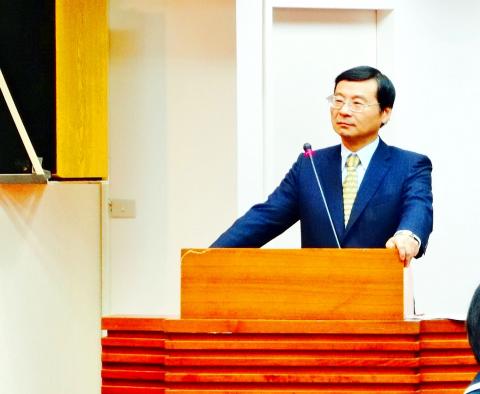The Bankers Association of the Republic of China (銀行公會) yesterday suggested that the Financial Supervisory Commission (FSC) free it from the duty of drawing up clauses for the draft act governing third-party payment services to avoid criticism over a conflict of interests.
Association chairwoman Lee Jih-chu (李紀珠), who was vice chairwoman of the commission from 2008 to 2010, made the suggestion in a long statement after domestic e-commerce providers questioned the association’s neutrality and the propriety of the group dealing with the issue.
SUGGESTION

Photo: Wang Meng-lun, Taipei Times
“I sincerely suggest that the commission make Internet firms draw up the drafts to facilitate the legislative process,” Lee said in the statement.
Lee’s statement also came after PChome Online Inc (網路家庭) chairman Jan Hung-tze (詹宏志) criticized the government over slow development of the nation’s third-party payment services and its reluctance to receive feedback from Internet companies regarding the draft act.
‘BLACK-BOX’ TALKS
The banking industry, the hardest hit by the rise of third-party payment services over the Internet, should not be put in charge of the matter, Jan has said on other occasions.
“The association acted behind closed doors, excluding online enterprises. It acted unilaterally in a secretive manner,” Jan has said.
Lee dismissed Jan’s accusation, saying that there definitely were no “black box” negotiations.
“I believe that both sides, the commission and the Bankers Association, have good intentions,” Lee said earlier this week.
“They hope to implement the laws as soon as possible, so enterprises that need them can begin to use them,” she said.
In the statement, Lee said the association has carried out its duty as instructed by the financial regulator, but it would be appropriate to limit itself to an advisory role and provide help only when needed.
Jan welcomed the gesture, saying that the commission should take heed and allow Internet companies to dominate the drawing up of legislative drafts related to third-party payments.
The commission has overlooked potential legal conflicts and could make amends by passing the duty to Internet firms, Jan said in a statement yesterday.
APOLOGY
Jan also offered an apology to Lee.
The controversy led FSC Chairman William Tseng (曾銘宗) to say at the Finance Committee that the commission would be in full charge of drawing up the draft act’s clauses and would invite third-party payment operators to join further discussion.

SELL-OFF: Investors expect tariff-driven volatility as the local boarse reopens today, while analysts say government support and solid fundamentals would steady sentiment Local investors are bracing for a sharp market downturn today as the nation’s financial markets resume trading following a two-day closure for national holidays before the weekend, with sentiment rattled by US President Donald Trump’s sweeping tariff announcement. Trump’s unveiling of new “reciprocal tariffs” on Wednesday triggered a sell-off in global markets, with the FTSE Taiwan Index Futures — a benchmark for Taiwanese equities traded in Singapore — tumbling 9.2 percent over the past two sessions. Meanwhile, the American depositary receipts (ADRs) of Taiwan Semiconductor Manufacturing Co (TSMC, 台積電), the most heavily weighted stock on the TAIEX, plunged 13.8 percent in

A wave of stop-loss selling and panic selling hit Taiwan's stock market at its opening today, with the weighted index plunging 2,086 points — a drop of more than 9.7 percent — marking the largest intraday point and percentage loss on record. The index bottomed out at 19,212.02, while futures were locked limit-down, with more than 1,000 stocks hitting their daily drop limit. Three heavyweight stocks — Taiwan Semiconductor Manufacturing Co (TSMC, 台積電), Hon Hai Precision Industry Co (Foxconn, 鴻海精密) and MediaTek (聯發科) — hit their limit-down prices as soon as the market opened, falling to NT$848 (US$25.54), NT$138.5 and NT$1,295 respectively. TSMC's

TARIFFS: The global ‘panic atmosphere remains strong,’ and foreign investors have continued to sell their holdings since the start of the year, the Ministry of Finance said The government yesterday authorized the activation of its NT$500 billion (US$15.15 billion) National Stabilization Fund (NSF) to prop up the local stock market after two days of sharp falls in reaction to US President Donald Trump’s new import tariffs. The Ministry of Finance said in a statement after the market close that the steering committee of the fund had been given the go-ahead to intervene in the market to bolster Taiwanese shares in a time of crisis. The fund has been authorized to use its assets “to carry out market stabilization tasks as appropriate to maintain the stability of Taiwan’s

STEEP DECLINE: Yesterday’s drop was the third-steepest in its history, the steepest being Monday’s drop in the wake of the tariff announcement on Wednesday last week Taiwanese stocks continued their heavy sell-off yesterday, as concerns over US tariffs and unwinding of leveraged bets weighed on the market. The benchmark TAIEX plunged 1,068.19 points, or 5.79 percent, to 17,391.76, notching the biggest drop among Asian peers as it hit a 15-month low. The decline came even after the government on late Tuesday authorized the NT$500 billion (US$15.2 billion) National Stabilization Fund (國安基金) to step in to buoy the market amid investors’ worries over tariffs imposed by US President Donald Trump. Yesterday’s decline was the third-steepest in its history, trailing only the declines of 2,065.87 points on Monday and